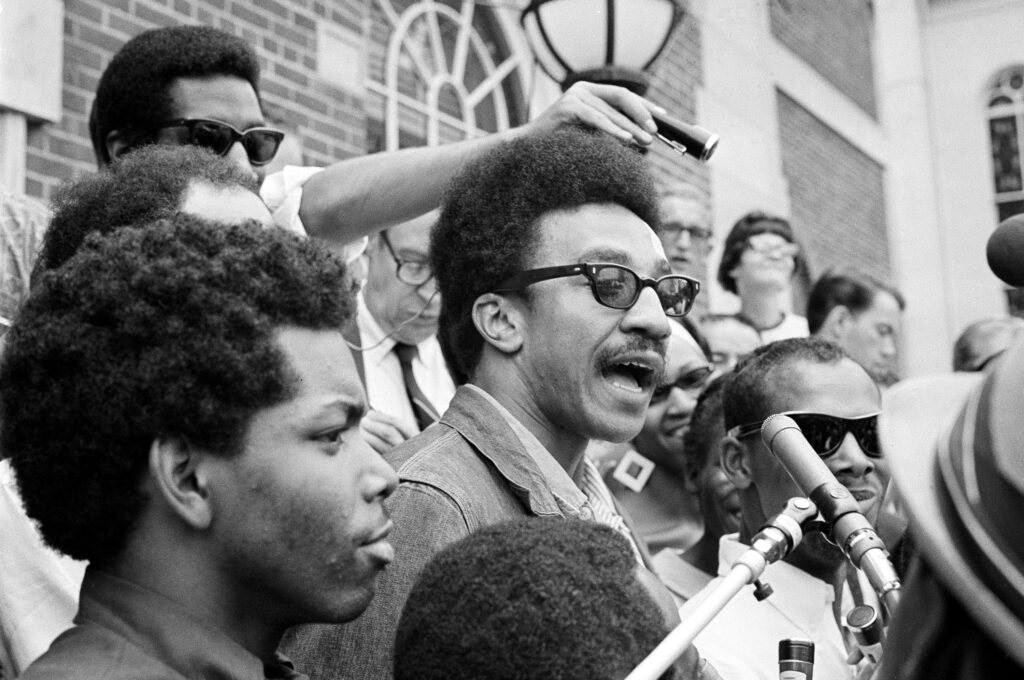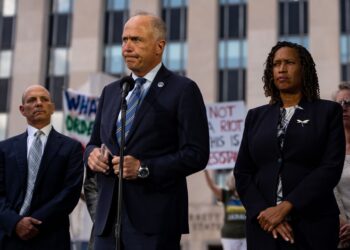Jamil Abdullah Al-Amin, who as H. Rap Brown became a magnetic and polarizing force in the 1960s Black Power movement, died Nov. 23 at a federal prison hospital near Butner, North Carolina, where he was serving a life sentence without parole for the 2000 murder of a sheriff’s deputy. He was 82.
Kristie Breshears, the communications director for the Federal Bureau of Prisons, confirmed his death but did not provide a cause. In February, the Washington Informer reported that Mr. Al-Amin had multiple myeloma and was in declining health.
Mr. Al-Amin rose to prominence during the waning days of the civil rights movement and reinvented himself decades later as an imam and shopkeeper in Atlanta. In 1967, he was elected chairman of the Student Nonviolent Coordinating Committee, which had maintained a commitment to Gandhian nonviolence under leaders such as John Lewis, the future congressman.
Under Mr. Al-Amin and his immediate predecessor, Stokely Carmichael, the group adopted a more radical approach to civil rights activism. In a decision that cost the organization many of its White allies, Mr. Al-Amin successfully pushed the SNCC to drop the word “nonviolent” from its name.
“I say violence is necessary,” he said in a 1967 interview. “Violence is a part of America’s culture. It is as American as cherry pie.”
Mr. Al-Amin took over the organization on the eve of the “long, hot summer of 1967,” as riots began to break out in Black neighborhoods across the country. Often sporting a black beret over his Afro, he became a face of the rage that was sweeping America’s cities. More than a century after the Emancipation Proclamation, Black America’s patience had run out, he argued, and the United States would either make good on its promises to Black citizens or face violence.
“Black folk built America,” he would often say in his speeches, “and if it don’t come around, we’re going to burn America down.”
Born in Baton Rouge on Oct. 4, 1943, Hubert Gerold Brown — “Rap” was a childhood nickname — was the youngest of three children of Eddie and Thelma Brown. His father worked for Standard Oil, and his mother was a teacher.
Mr. Al-Amin spent two years at Southern University, a historically Black institution in Baton Rouge, before going to Washington to work in the civil rights movement with his older brother Ed Brown, a student at Howard University who had been organizing lunch-counter sit-ins for the SNCC.
He soon headed back south, organizing voter registration drives in Mississippi and Alabama before returning to Washington and taking charge of SNCC’s local chapter.
During that time, he allied himself with the group’s more radical leaders, including Carmichael, later known as Kwame Ture. When Carmichael stepped down as SNCC’s chairman in 1967, Mr. Al-Amin, then 23, was elected to lead the organization at a time when its members were weary of seeing civil rights activists jailed, bloodied and killed, and increasingly skeptical that the federal government would do anything to halt the violence.
When a fire engulfed parts of Cambridge, Maryland, in 1967 after Mr. Al-Amin delivered a speech in the town, officials accused him of inciting a riot.
“I see all them stores sitting over there with all them honkies over there owning them,” Mr. Al-Amin said in his extemporaneous 45-minute speech, addressing a crowd estimated at around 400 people. “You got to own some of them stores. I don’t care if you have to burn them down and run him out. You got to take over them stores. The streets are yours. Take them.”
Not long after his speech ended, the crowd began to disperse and police opened fire, according to news reports. Mr. Al-Amin suffered a minor injury from a shotgun pellet. He later argued that he was being targeted and demonized for speaking the truth about conditions in the nation’s Black communities.
The next year, conservatives in Congress successfully added a provision to the landmark 1968 Fair Housing Act, which prohibited discrimination in housing based on race, ethnicity, religion and other factors. The measure, which they dubbed the “H. Rap Brown Law,” made it a federal crime to cross state lines to spark a riot.
Mr. Al-Amin became the target of investigations and surveillance by the FBI, which monitored civil rights activists through its invasive COINTELPRO operation. In one internal memo, the agency trumpeted the success of tactics used against Black revolutionaries in Philadelphia, who were “arrested on every possible charge until they could no longer make bail.”
The pressure campaign did little to soften Mr. Al-Amin’s rhetoric.
“I’ve always had the utmost confidence in me and the gun,” he wrote in his 1969 autobiography, “Die Nigger Die!”
“A gun won’t fail you,” he continued. “People will.”
After skipping a 1970 court appearance in connection with the Cambridge riot, Mr. Al-Amin went underground and was placed on the FBI’s Most Wanted List. He resurfaced a year and a half later in New York City, after a shootout with police during an attempted robbery of a Manhattan lounge.
Mr. Al-Amin was convicted on robbery and assault charges, and served five years at the Attica state prison in New York, where he converted to Islam and adopted the name Al-Amin, Arabic for “the Trustworthy.”
Upon his release in 1976, he settled in Atlanta’s West End, a neighborhood with a rich well of Black history but burdened by decades of poverty, violence and government disinvestment. He opened a small grocery store and later a mosque, and became known for brokering peace in street disputes, helping people navigate city bureaucracy and counseling young people drifting into drugs or petty crime.
William T. Allen, a Vietnam veteran who struggled to readjust to civilian life, described Mr. Al-Amin as a force for good in the community.
“He would tell us things that kept us straight,” Allen said in a 2000 interview with The Washington Post. “Anything that was on my mind, I would ask him. I’m not Muslim, I’m Baptist, but he would tell me to go to church and give God time. He was like a father to me.”
But Mr. Al-Amin continued to have run-ins with the police. Each encounter with law enforcement only reinforced his supporters’ belief that he was being targeted because of his earlier activism.
In 1995, Mr. Al-Amin was arrested for shooting a neighborhood resident near his store. The victim identified Mr. Al-Amin as the assailant but later recanted, saying that police had pressured him into making a false accusation. Mr. Al-Amin was later charged with driving a stolen Ford Explorer and impersonating a police officer. His failure to attend a court hearing in that case triggered an arrest warrant that two sheriff’s deputies tried to serve him on March 16, 2000.
Both deputies were shot while approaching Mr. Al-Amin’s store. One of the men later died of his wounds. A manhunt ensued, ending days later when Mr. Al-Amin was arrested in rural Alabama. Weapons recovered nearby were matched to those used in the attack.
Mr. Al-Amin insisted he was innocent, arguing that police had targeted him and planted evidence. His supporters, including religious leaders and former SNCC colleagues, raised doubts about the forensic work and noted inconsistencies in eyewitness accounts.
Convicted of murder, he received a life sentence in 2002. Information on his survivors was not immediately available.
Mr. Al-Amin unsuccessfully tried to appeal his conviction in 2004 and 2019. The next year, supporters pushed for a new trial on the grounds that prosecutors had illegally withheld exculpatory evidence — including a prison inmate’s confession to having shot the deputies. That effort failed as well.
Around the time of his 2000 trial, the Atlanta Journal-Constitution uncovered police records revealing that local and federal authorities had investigated Mr. Al-Amin after the World Trade Center bombing in 1993. To many of his supporters, it seemed like proof that the 2002 conviction was only the latest step in the government’s attempt to silence Black radicals who had come up in the 1960s.
Many of the movement’s leaders remain distrustful of law enforcement, said Taylor Branch, a Pulitzer Prize-winning historian of the civil rights era.
“The case is shrouded in mystery. Both sides claim that there’s evidence to reach the opposite conclusion. I never knew what to make of it,” he said of Mr. Al-Amin’s conviction. “But it’s very hard to know with some of these cases, because there was so much animosity in law enforcement for the people in the movement.”
The post Jamil Al-Amin, Black Power activist known as H. Rap Brown, dies at 82 appeared first on Washington Post.




